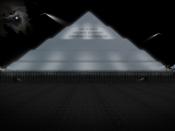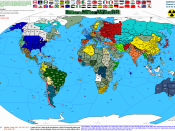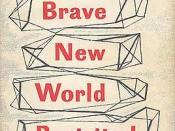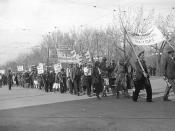The edges and borders of optimistic and pessimistic worlds clash and cross time and time again in George Orwell's 1984 and Aldous Huxley's Brave New World. Although, at first glance, the two tales of futuristic societies appear as different as black and white, the true modes of government glow in a similar shade of gray. Both books strive for an ultimate goal: stability, even though both societies take different approaches. Mr. Orwell and Mr. Huxley created their stories as a cry to the peoples of the world, cautioning them about the follies of a totalitarian government.
In 1984, the Inner Party acted as the highest power although they were below Big Brother. Big Brother played a role of an idea more than he did as a living person. The party loved him and treated him as a deity, but never in the book did he appear. Through the Inner Party, Big Brother laid down laws and punishments.
He obtained social control over the people through the use of telescreens, large television like boxes that could not be turned off and allowed the Party to tap into one's home at any time, brainwashing, the sheer threat of the thought police, and sending the children of Party members to schools with curriculum specially designed to mold them into perfect model citizens. With the use of victory gin, Newspeak, and the thought police, the people of Oceania remained in a constant state of stupidity, confused by the constant change of history and overrun by the complicated language created by the Party. By keeping its people stupefied, the Party gained more power to change history.
"War is Peace Freedom is Slavery Ignorance is Strength" Slapped everywhere, this phrase, so full of contradictions, became possible through the reality of doublethink. Doublethink is the single most potent form of confusion. It allowed the masses to be oppressed and controlled. Through the process of doublethink, a person could take a once truth from the party and a new lie and, by accepting the previous truth as a lie, they could accept the new lie as truth. With doublethink backing them up, the Party allowed the state of Oceania to constantly stay in war. By letting the citizens believe they were battling Eastasia or Eurasia, whichever applied at the time, they accepted the poor living conditions, believing that once they defeated their enemy, things would be better. The Party controlled every aspect of a person with the threat of the thought police. Including sex. Sex, as entertainment, was considered obscene. No member of the party engaged in sex unless they were married, and even then, it was to be used for "the duty to the Party", otherwise known as making a baby. Through its strict control over its citizens, the Party obtains stability.
"Till at last the child's mind is these suggestions, and the sum of the suggestions is the child's mind. And not the child's mind only. The adult's mind too - all his life long. The mind that judges and desire and decides - made up of these suggestions. But all these suggestions are our suggestionsâ¦Suggestions from the State." These words, spoken by the Director, practically sum up how control is kept over the characters of the book Brave New World. The director speaks of conditioning the children from creation, training them for their allotted place in society. Using sex for reproduction has been completely outdated and now, genetic engineering takes its place. All children are test tube babies and each child's role in society is predestined. "Alpha children wear grey. They work much harder than we do, because they're so frightfully clever. I'm awfully glad I'm a Beta, because I don't work so hard. And then we are much better than the Gammas and Deltas. Gammas are stupid. They all wear green, and Delta children wear khaki. Oh no, I don't want to play with Delta children. And Epsilons are still worse. They're too stupid to be able to read or write. Besides, they wear black, which is such a beastly colour. I'm so glad I'm a Beta." This statement is part of a sleep-teaching technique known as hypnopaedia. Conditioning prepares children for their lives and by embedding laws into their minds as children; they are less likely to be problem adults. They are stupefied from hypnopaedia because it is all they know. They cannot fight that which is a part of them. As a totalitarian society, control and oppression are obtained in techniques similar to that of 1984's but come about it in a less harsh way. Soma, the perfect drug, helps to cloud a person's memory, making it easier for them to oblige to the ways of the World Controllers. The government controls everything because they control the hypnopaedia and the conditioning. By keeping the citizens in a consistent ignorant bliss they obtain stability. Like 1984, God as we know Him has been abolished and replaced by the earlier 1900's engineering tycoon Henry Ford. Unlike 1984, sex rates as the number one source of entertainment. Children as young as seven play erotic games and adults take part in casual sex with many different people or even join together in an "orgy porgy" or other erotic pleasures such as "feelies" or sent organs.
Both our stories, George Orwell's 1984 and Aldous Huxley's Brave New World, strive for the common goal of stability and both reach it in very similar yet very different paths. While one deprives the people of adequate housing, promising that brighter days are coming, the other feels that "Ending is better than mending. The more stitches, the less riches." Where is the line that separates the two states? Or is there a line?





